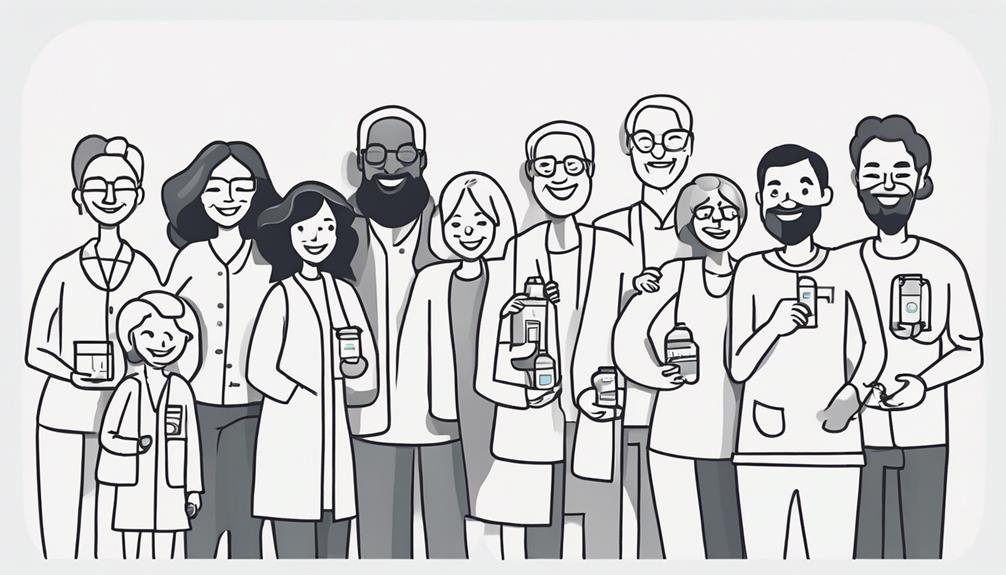Managing diabetes meticulously mandates medication as a crucial component. But have you ever pondered why this reliance on medication is paramount for optimal control?
The intricate dance between blood sugar levels, insulin production, and cellular response necessitates a closer look at how medications play a pivotal role in this delicate balance.
Stay tuned to unravel the intricate web of connections between diabetes management and medication that could potentially transform your approach to controlling this chronic condition.
Key Takeaways
- Insulin regulates blood sugar levels crucial for diabetes control.
- Different medications target insulin production and sensitivity.
- Combination therapy enhances effectiveness and reduces side effects.
- Medication adherence is vital for optimal diabetes management outcomes.
Importance of Insulin in Diabetes Control

To effectively manage diabetes, understanding the crucial role of insulin in regulating blood sugar levels is essential. Insulin regulation plays a vital part in maintaining glucose control within your body.
When you consume carbohydrates, your body breaks them down into glucose, which enters the bloodstream. In response, the pancreas releases insulin to help cells absorb this glucose for energy or storage. This process is crucial to prevent blood sugar levels from becoming too high (hyperglycemia) or too low (hypoglycemia).
Insulin acts as a key that unlocks cells, allowing glucose to enter and be utilized for energy production. Without enough insulin or if the body becomes resistant to its effects, glucose accumulates in the bloodstream, leading to high blood sugar levels. This imbalance can result in serious complications over time if not properly managed.
Therefore, ensuring proper insulin function is fundamental for maintaining optimal glucose control and overall health when living with diabetes.
Types of Diabetes Medications Available
A variety of diabetes medications are available to help manage blood sugar levels and improve insulin function. For oral medications, options include metformin, sulfonylureas, meglitinides, DPP-4 inhibitors, SGLT2 inhibitors, and thiazolidinediones. These medications work in different ways to lower blood sugar levels, either by increasing insulin production, reducing glucose production in the liver, or improving insulin sensitivity in the body.
On the other hand, injectable options include insulin and GLP-1 receptor agonists. Insulin therapy is essential for type 1 diabetes and sometimes required for type 2 diabetes when other medications aren't effective enough. GLP-1 receptor agonists help stimulate insulin secretion and inhibit glucagon release, leading to better blood sugar control.
Each type of medication may come with specific side effects and dosage adjustments. It's crucial to work closely with your healthcare provider to monitor your response to the medications, manage any side effects, and make necessary dosage changes to achieve optimal blood sugar management.
Benefits of Combination Therapy

Combining multiple diabetes medications, known as combination therapy, can offer enhanced efficacy in managing blood sugar levels and optimizing insulin function. When considering treatment options for diabetes, combining medications can provide several benefits:
- Improved Blood Sugar Control: Combining different classes of medications can target multiple pathways involved in blood sugar regulation, leading to more effective control of glucose levels.
- Enhanced Medication Effectiveness: Utilizing a combination of medications with complementary mechanisms of action can enhance their overall effectiveness in managing diabetes symptoms and complications.
- Reduced Side Effects: By using lower doses of multiple medications instead of a high dose of a single medication, the risk of experiencing adverse side effects may be minimized while still achieving optimal blood sugar management.
Incorporating combination therapy into your diabetes management plan can offer a comprehensive approach to addressing the complexities of the condition, ultimately leading to improved outcomes and better quality of life.
Role of Medication Adherence in Management
Managing diabetes effectively requires strict adherence to medication regimens, playing a crucial role in controlling blood sugar levels and preventing complications. Adherence challenges, such as forgetfulness or concerns about side effects, can hinder your progress in managing diabetes. Patient education is key in overcoming these challenges. Understanding why you need to take your medications as prescribed and the potential consequences of non-adherence can motivate you to stay on track.
Research shows that medication adherence significantly impacts the effectiveness of diabetes management. Consistently taking your prescribed medications helps maintain stable blood sugar levels, reducing the risk of hyperglycemia and hypoglycemia. This, in turn, lowers the likelihood of developing serious complications like heart disease, kidney damage, or nerve problems.
Future Developments in Diabetes Medication

Exploring the horizon of diabetes management, upcoming advancements in medication hold promise for revolutionizing treatment approaches and enhancing patient outcomes. In the realm of diabetes medication, the future looks bright with innovative therapies and precision medicine paving the way for personalized treatment strategies.
Here are three key developments to look out for:
- Novel Therapies: Researchers are actively exploring new drug classes and formulations that target different pathways involved in diabetes pathophysiology. From SGLT-2 inhibitors to GLP-1 receptor agonists, these cutting-edge therapies offer improved efficacy and safety profiles, providing patients with more options to manage their condition effectively.
- Precision Medicine: The era of precision medicine in diabetes is dawning, where treatment decisions are tailored to an individual's unique genetic makeup, lifestyle factors, and disease characteristics. By utilizing advanced technologies like genetic testing and artificial intelligence, healthcare providers can deliver personalized care plans that optimize outcomes and minimize side effects.
- Advanced Drug Delivery Systems: The development of sophisticated drug delivery systems, such as smart insulin pens and implantable devices, is on the rise. These technologies aim to enhance medication adherence, reduce injection burden, and improve overall patient convenience, ultimately leading to better glycemic control and quality of life for individuals with diabetes.
Frequently Asked Questions
What Are Some Common Side Effects of Diabetes Medications and How Can They Be Managed?
To manage common side effects of diabetes medications, focus on lifestyle modifications like dietary restrictions and exercise routines. Support groups can provide encouragement and guidance. Stay proactive in monitoring your health and communicate openly with healthcare providers.
Are There Any Alternative Treatments or Natural Remedies That Can Help Manage Diabetes Without Medication?
Explore herbal remedies and lifestyle changes for diabetes management. Incorporate acupuncture and mindfulness techniques for a holistic approach. Remember, there are options beyond medication that can support your journey to better health and well-being.
How Does Stress and Mental Health Impact Diabetes Management and Medication Effectiveness?
To manage diabetes effectively, stress management and mental health play crucial roles in how medication works. Incorporating lifestyle modifications, mindfulness techniques, and a holistic approach can enhance medication effectiveness and overall well-being in your diabetes management journey.
Can Diet and Exercise Alone Be Enough to Manage Diabetes Without the Need for Medication?
Diet and exercise can help manage diabetes, but medication might still be necessary. Natural remedies and alternative treatments can complement traditional methods. Consult with your healthcare provider to create a personalized plan for optimal diabetes management.
How Does Socioeconomic Status and Access to Healthcare Impact Medication Adherence and Overall Diabetes Management Outcomes?
In managing diabetes, social disparities and healthcare access greatly influence medication adherence. Barriers to obtaining medication can impact treatment outcomes. Understanding these factors is crucial for improving overall diabetes management and health outcomes.
Conclusion
So, you see, medication plays a crucial role in managing diabetes effectively.
Despite concerns about side effects, advancements in medication have made treatment safer and more personalized.
By working with your healthcare provider to find the right combination of medications, you can achieve better control over your blood sugar levels and reduce the risk of complications.
Remember, medication is just one part of a comprehensive diabetes management plan that includes healthy lifestyle choices and regular monitoring.